Dreams for the Generations
Words and photos by Dalet Valles
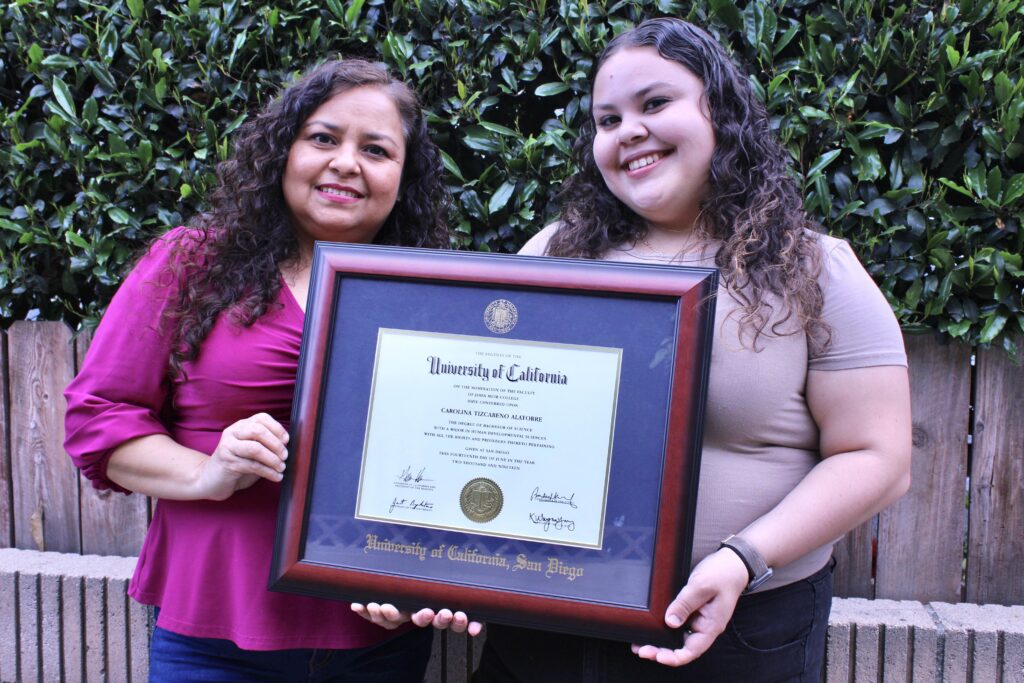
Long live the rose that grew from concrete when no one else even cared.
Tupac Shakur
People work toward a dream that is so highly advertised in the land of the free yet unattainable for a majority of the inhabitants of that land. A mother comes to the United States to seek a better life for herself. What she did not expect is that the dream would pass on to the next generation — that the dream would be given to her daughter. The sacrifice of crossing the border and putting her life at risk yet only reaping the benefits through the opportunities granted to her daughter. This is the gap between generations that Latina mothers and daughters face.
Latinas are alike in culture but different in many ways. A mother with brown skin and curly black and white hair hair was born and raised in Nayarit, Mexico. A daughter with ivory skin and brown and blonde curly hair born in Reno, Nevada and raised in Los Angeles, California. Griselda Tizcareño, 49 years old, and her daughter, 25-year-old Carolina Tizcareño Alattore, have journeyed different paths in the land that many immigrants consider the nation of opportunities.
Tizcareño first arrived in the United States at the age of 22. Two years later, she had her daughter Tizcareño Alattore. Now, Tizcareño Alattore, at the age of 25, has a different path compared to her mother. The lives of first-generation Latina mothers and second-generation American-Latina daughters are both commonalities but differences.
At 22, Tizcareño crossed the border into the United States with false documentation. The journey was prompted as a necessity to find a better lifestyle and opportunities. As an undocumented immigrant, she depended heavily on family connections she already had in the U.S. to get her by.
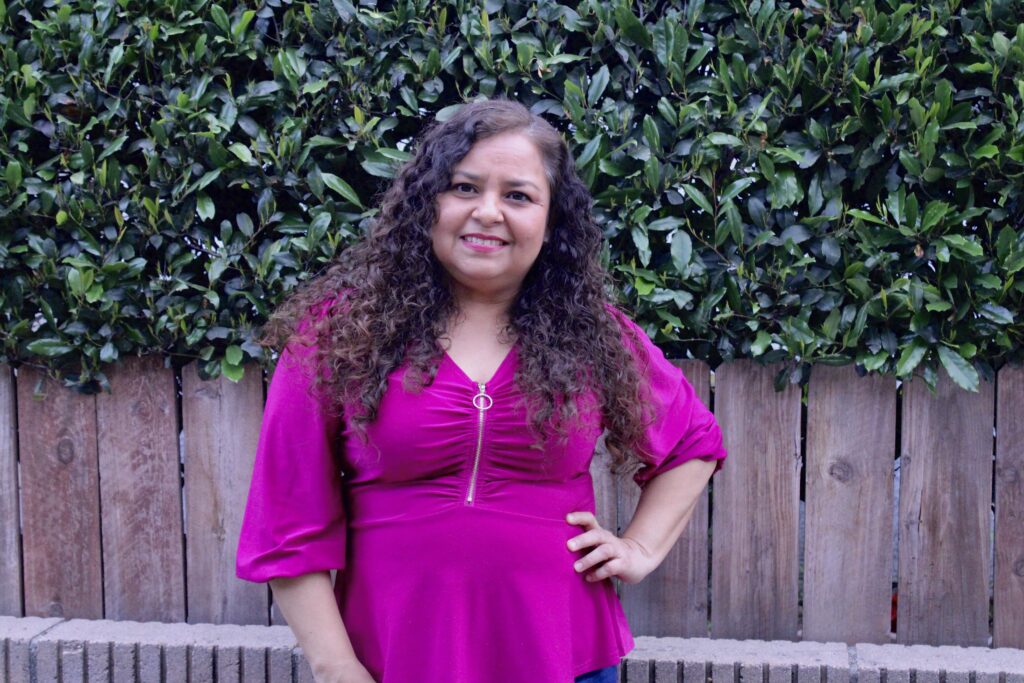
“My cousin worked at a Mexican restaurant so when I arrived I was able to get my first job there,” she said.
Tizcareño was able to communicate with the staff because of their shared language. However, when it came time to speak to customers, she struggled to get by with the little English she knew.
“It was difficult for me,” Tizcareño said. “[The customers] asked for a spoon and I did not know. The language was a struggle for me. I knew what customers wanted when they asked for a plate, but when they asked for a bowl, I didn’t know.”
Now, Tizcareño has advanced in her English and has even attained her residency. Despite not being fluent in English, she is now able to communicate better. Comparing her arrival to her time in the U.S. now, Tizcareño has noted that she is able to attain better opportunities because of her legal status.
“The change of my legal status does make employment easier,” Tizcareño said. “It is easier to get a job and it is easier to get a better job.”
Even as a legal resident and learning the language, the opportunities are still limited. Tizcareño, like many others, entered the U.S. seeking a better life, better opportunities, and ultimately seeking the American dream. The opportunities, however, have passed on to the next generation. Tizcareño is able to see the better life within her daughters life as she motivated her to pursue higher education and careers. She is able to see the marks of opportunities shaping her daughters life.
For many American-Latinas, there are many identifying factors. For Tizcareño Alattore, that is being a first-generation college student and a second-generation Latina, also known as a Latina born to immigrant parents. Despite these identifiers, Tizcareño Alattore has struggled within her own culture and within her own generation.
Tizcareño Alattore received her bachelor’s degree from the University of California, San Diego, but her journey to this and other opportunities came with many obstacles. Attaining her success now, both in her career and education, did not come without struggle; did not come without sacrifices made by her and her mother.
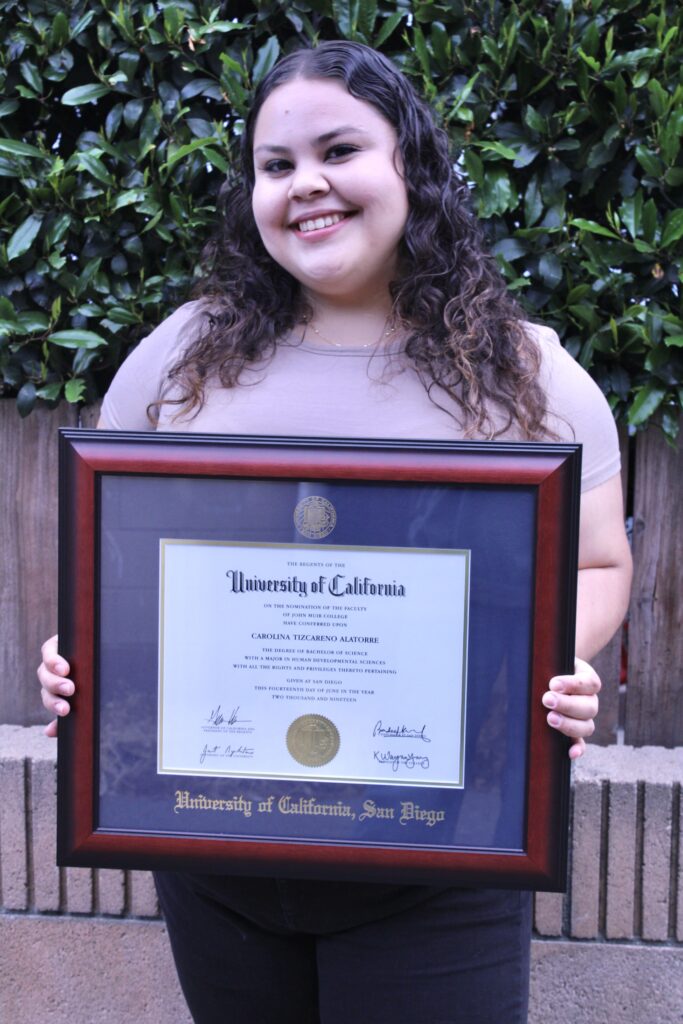
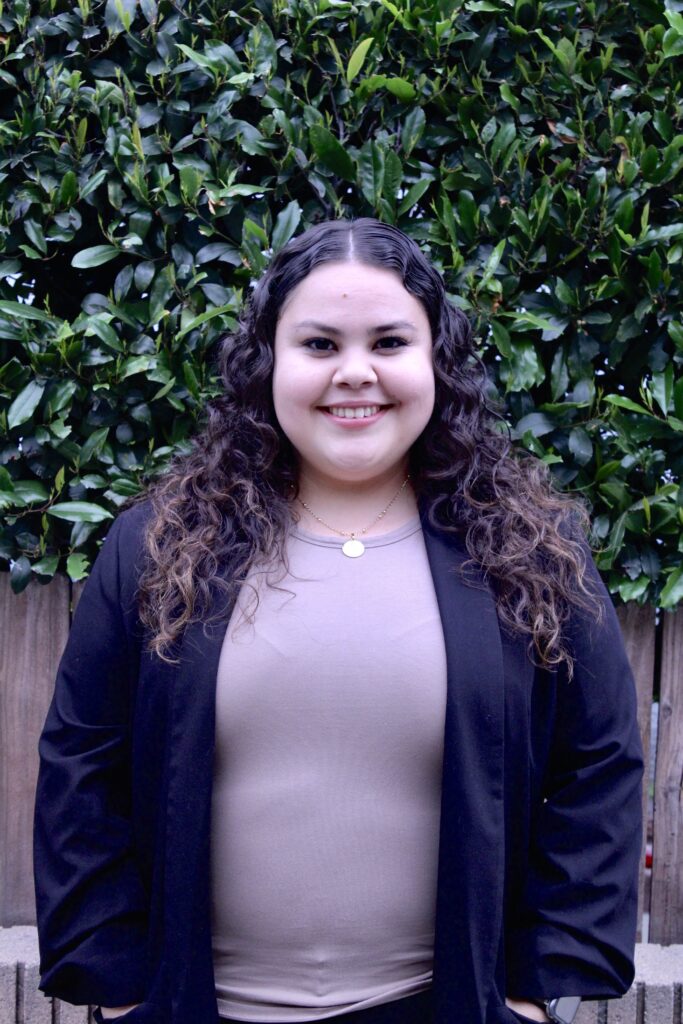
“It helped me a lot that, early on, she told me that she wanted to go to college and that it was not going to be local,” Tizcareño said. “Since her high school freshman year, she was in a program that allowed her to experience college. She prepared herself and myself in this transition.”
Tizcareño Alattore graduated from Jordan High school in Long Beach, C.A. as valedictorian and went on to a four-year research based university. During her time in college, Tizcareño Alattore struggled with fitting in as a Latina in a predominantly White institution. However, she was presented with barriers long before she made the transition.
“It takes a lot more for me to get these opportunities because I am Mexican-American,” Tizcareño Alattore said. “In high school, I had to work twice as hard as anybody else and same in college. I realized that I didn’t come from similar backgrounds as some kids in terms of economically and where I lived. I don’t live in a house and financially it is not the same. That is one of the barriers that has made it hard to get opportunities. The access to resources for my parents is now translating to me because they didn’t know about things. It would be easier if I had parents who knew.”
Tizcareño Alattore, like many children of immigrant parents, have had to learn by themselves things that are common knowledge to many. Filling out financial aid was a struggle, even the task of applying to college was new and confusing. Yet, for the children of immigrant parents, translating in certain scenarios and helping parents with documentation is their normal.
“With academics, it was hard because I always had to figure things out on my own or having to translate at school conferences and having to do certain paper work now for my parents,” Tizcareño Alattore said.
Now that Tizcareño Alattore is 25, she expresses her struggle in understanding credit, assets, and property because it is not something that her parents were familiar with. “You hear others talk about assets, properties, and credit, but that is something I am still learning about. That is a barrier towards getting opportunities,” she said.
As difficult as that may be for her, she still worked toward advancing academically and professionally. Tizcareño Alattore is the first in her family to attend and graduate college and overcame the struggles presented to her in the transition. She faced a culture shock in college but found community in a Latina sorority and a Bible study group for Latinos. She does not call it her sob story, as many college students call it, but rather the reality of her life.
When she committed to UCSD, she did not realize that there was an immigration check point in order to get to campus, which changed her happiness of her success to fear. She worried about the possibility of her mother getting deported when visiting her. Though her mother could not be by her side on her academic journey, Tizcareño Alattore credits a lot of her success and opportunities to her mother.
“She always encouraged me in whatever I wanted to do so that has always helped me,” Tizcareño Alattore said. “She was a stay at home mom for a long time so just her being present in my school activities or conferences has helped me too. When I was away at college, she did remind me why I was there and always pushed me to get to the next step. She still does that now and I wouldn’t have been able to be successful if it wasn’t for that. She just grounds me. I think her dedicating so much of her life to my brother and I really does show in my success.”
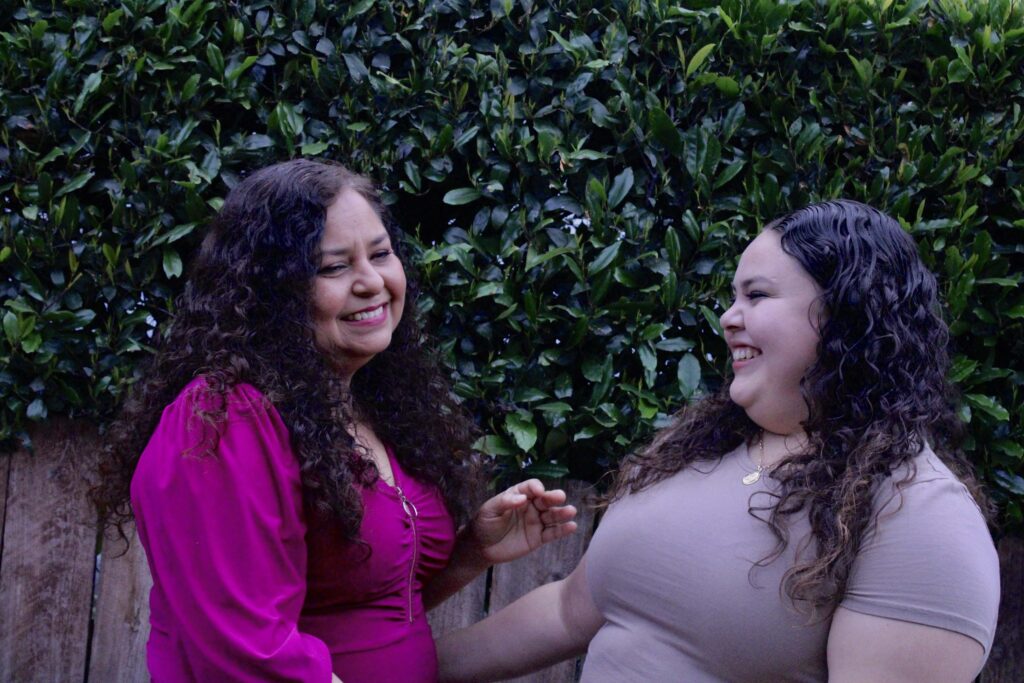
From an early age, Tizcareño was involved in advancing Tizcareño Alattore’s success. This first started by teaching her how to read, speak, and write Spanish which has now helped her in her academic and career pursuit.
Tizcareño Alattore is currently working toward attaining her teaching credential and is gaining experience through working with school nearby. She has faced some highs and lows in this journey. She shared that she has faced challenges with a coworker because of her background.
“I’ve been feeling culture shock recently in my job because the students there are predominantly white; the staff there is predominantly white,” she said. “My first week there, I was facing staff doubting me and I just had to use my identity to set my foot down and say ‘Yes, even though I am not the same as you all, I still belong here.’”
Tizcareño Alattore explained that her experience brought on judgement and stereotypes common to a Latina. Her university education and knowledge were being questioned.
“Hearing all of that from one person in a short amount of time is very hurtful because you are like, “This is America,” and it is 15 minutes away from home which is why I have been very shocked,” Tizcareño Alattore said. “Before, I would have been crying about it but now I put my foot down. I put my foot down, but I had to do it in a way that is not stereotypical.”
Despite being judged for her background, Tizcareño Alattore has been able to use it to her advantage. She is passionate about serving the community by utilizing her background as a Latina. Being able to read, speak, and write in Spanish has given her an upper hand when it comes to job opportunities.
Tizcareño Alattore is currently studying at the California State University, Long Beach to receive her credential in Special Education and Teaching. She plans to enter a masters program in the near future and is considering a pursuit for her doctorate degree.
“My advice is to keep going until she reaches her goal,” Tizcareño said. “I know that she puts in the work and that with the help of God she will reach it. Hopefully, in the next year she graduates.”
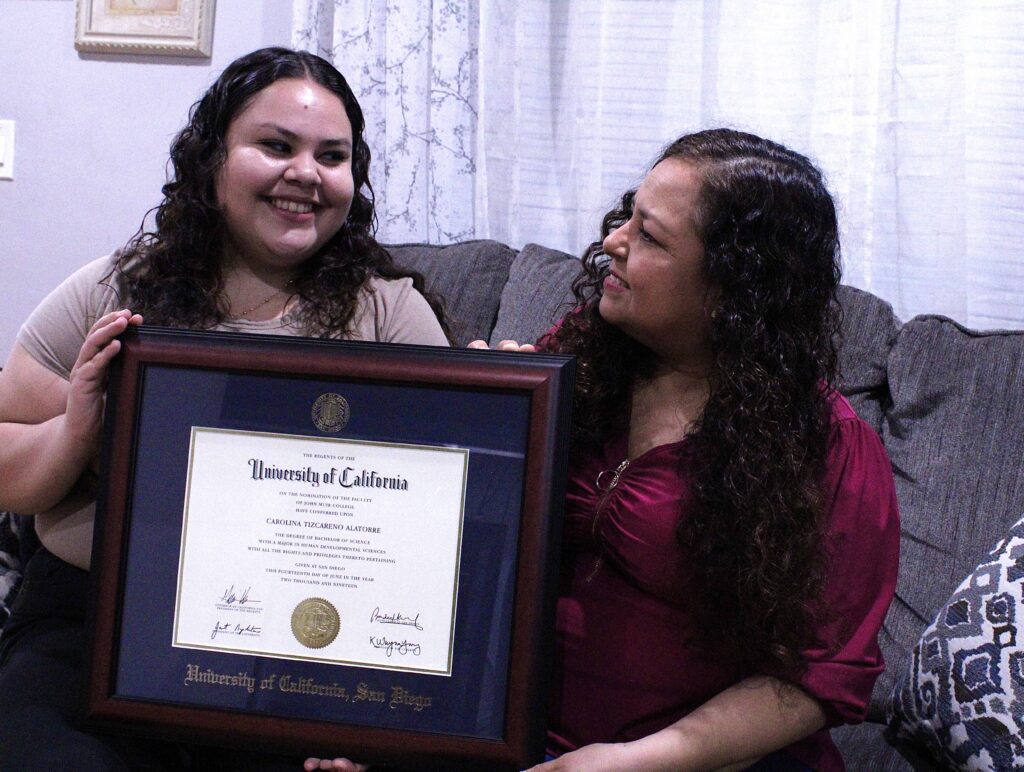
When asked about defying the odds, Tizcareño Alattore said, “The rose that grew from concrete. I just feel like that’s what being a Latina in the U.S. is like. There is just so many barriers that are almost impossible to overcome whether it’s finances, generational trauma, language barriers, all of those things that makes it hard to grow and stem out. However, there are a lot of Latinas who do overcome these obstacles. It is possible to be successful as a Latina in America. Never give up your identity even if society tells you you don’t belong. It is okay to take up space in the places where you are not supposed to take up space.”
Tizcareño, a woman from Nayarit, Mexico, has gifted her daughter a better life. Despite the barriers, stereotypes, and judgement placed upon both of them, the pursuit of the dream for opportunities has continued to grow beyond the generational gap.